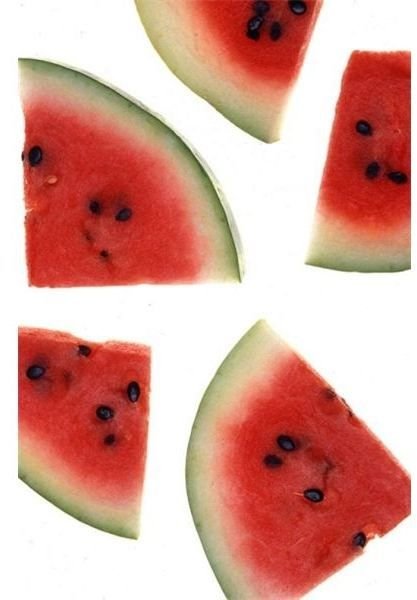Watermelon Nutrients: Learn the Health Benefits of Watermelon
Watermelon
Watermelon, a fruit that is actually a vegetable, is part of the Cucurbitaceae family. It is related to other plants that grow on vines on the ground, such as squash, cucumber, cantaloupe, and pumpkin.
There are over 50 varieties of watermelon. They come in different shapes (round, oblong, or spherical) and colors (red, orange, yellow, or white flesh). Most have seeds (black, brown, green, white, or yellow) while others are seedless.
Watermelon is tasty, refreshing, low in calories, fat-free, and packed with vital nutrients.
Health Benefits of Watermelon - Watermelon Nutrients
Watermelon is 92% water, 8% sugar, and high in electrolytes (sodium, potassium, and magnesium), making it a wonderful “energy drink” to hydrate the body.
Watermelon is a good source of vitamin A and beta carotene. Eating watermelon is actually better for your eyes than eating carrots in preventing age-related vision loss (such as macular degeneration and cataracts).
Other watermelon nutrients include vitamin C, thiamin, vitamin B6, and vitamin B1.
Watermelon provides more nutrients per calories than many other fruits.
Watermelon Nutrients - Antioxidants
Besides including the antioxidants vitamin C, vitamin A, and beta carotene, research has recently discovered watermelon is rich in lycopene (a phytochemical). On average, watermelons have about 40% more lycopene than raw tomatoes.
Antioxidants protect cells against free radicals (damaging molecules that play a role in cancer, heart disease, and other diseases). Lycopene is said to be particularly effective in preventing prostate cancer.
Watermelon Nutrients - Citrulline
Watermelon is high in citrulline, a non-essential amino acid our bodies use to make arginine, an essential amino acid. Benefits of these amino acids include:
- removing ammonia from the body
- lowering blood pressure
- promoting energy
- strengthening the immune system
- stimulating the pancreas to release insulin
- maintaining acid base balance.
According to scientists at the Texas A&M’s Fruit and Vegetable Improvement Center, citrulline found in watermelon acts similar to sildenafil citrate (better known as Viagra).
Tips on Getting the Best Health Benefits of Watermelon
Watermelon nutrients, especially antioxidants, are best in fully ripened watermelons.
When buying or choosing a watermelon from your garden, look for one that is firm and heavy for its size. The rind should be relatively smooth (not overly shiny or dull). One side of the watermelon (the underbelly) should have a yellowish coloration to it, indicating it has been resting on the ground long enough for it to be ripe.
Watermelons with a yellow colored flesh appear to have the most citrulline.
Watermelon nutrients are decreased when refrigerated. According to an USDA study, watermelons stored at room temperatures contain 40% more lycopene and 50-139% more beta carotene.
Photo Credit
Image in the public domain.
Disclaimer
Please read this disclaimer regarding the information contained within this article.
This post is part of the series: Tasty Treats
Health benefits of fruits.
